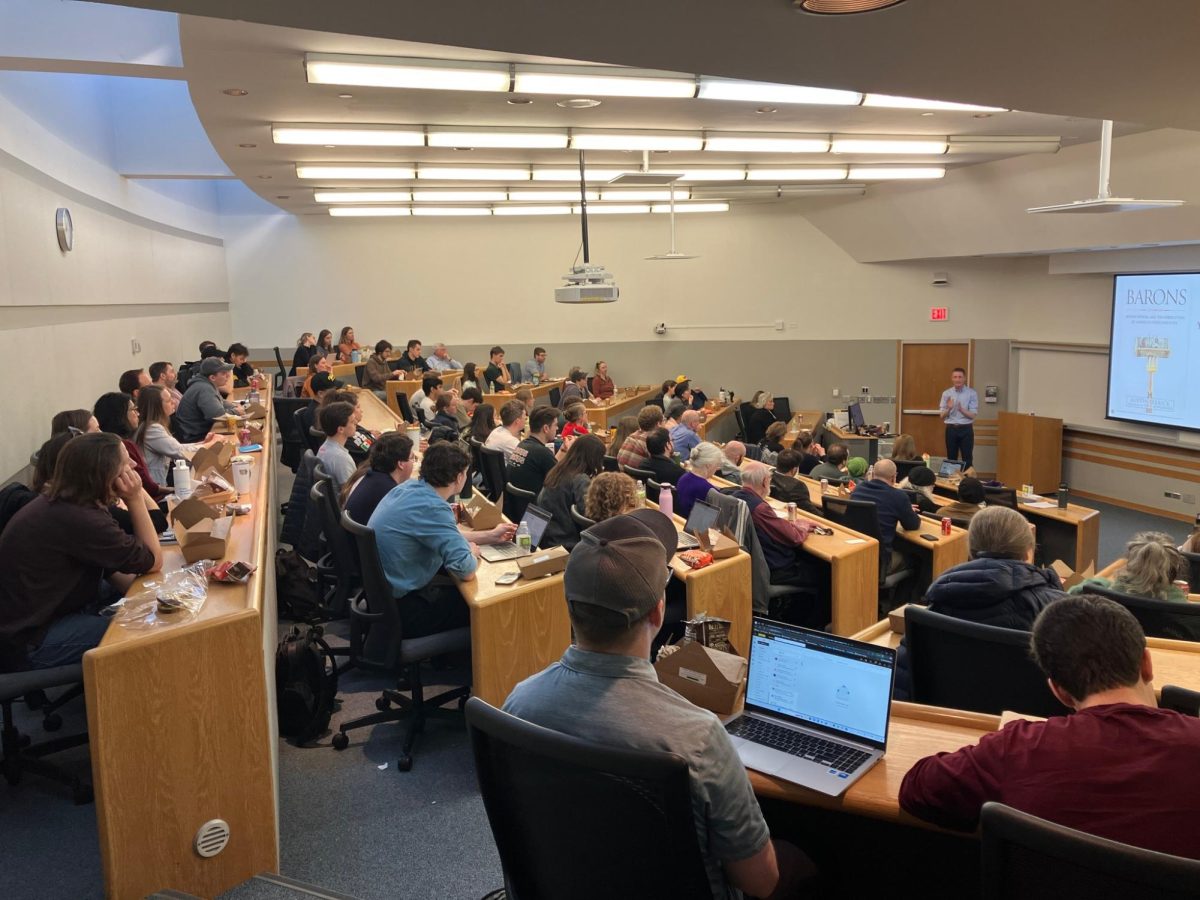Iowa native Austin Frerick always cared about our food system, rooted in the time he spent with his grandfather’s farm growing up.
As an adult, Frerick spent five years researching the nation’s food industry, culminating in his book, Barons: Money, Power and the Corruption of America’s Food Industry, which traces the rise of seven titans of the food industry and the cost of sustaining the system.
Frerick will speak at 7 p.m. Thursday in the Ames Public Library.

About the book: A key theme throughout the book is that our food industry is working exactly as it is designed. It also challenges the premise that the system makes cheap food.
The book’s chapters each focus on a large pillar of the food industry and its most influential person or persons — the barons, such as the Cargill-MacMillan family (Cargill Inc.) in grain, the Reimann family (JAB Holding Company) in coffee, Sue and Mike McCloskey (Fairlife and Fair Oaks Farms) in dairy, and J. Miles and Garland Reiter (Driscoll’s) in berries.
“These are people who crossed ethical lines that others didn’t, but they also saw a future that others didn’t,” Frerick said.
Using the term baron, Frerick wanted to conjure up images of powerful businessmen of a past age, but one that also invokes the cartoons they were subject to. It’s to empower the reader.
A paperback version of the book will be released Sept. 2, and it includes a new chapter on distribution barons — Sysco to be precise.
Grocery shopping: “The grocery store is fun. How much skill and science goes into it is unbelievable,” Frerick said. “People have a lot of strong opinions about grocery stores but no one researches it. It’s such a weird sweet spot. We care about them but nobody knows about them.”
The hurdles and shenanigans that occur to get a new product on a shelf is awing, Frerick said. And few people, including academics, understand it.
He speaks well of Iowa’s Fareway and Hy-Vee grocery stores, noting their direct involvement within the community. If something catches on at a farmers market, those are stores that can help it.
But, Frerick said, the general consolidation of grocery stores gives chains the ability to charge more and have a larger dominance over pricing. Walmart, the largest grocery in the country, is the subject of a chapter in Barons.
Geographical gap: Frerick said the book, which was first released in spring 2024, has had a long shelf life, doing well in the middle of the country.
He said previous book talks have been popular in some small towns where many people will stay after to talk to him about their experiences and how they’ve seen the system change in their lifetime.
Generational gap: Frerick also found a generational gap in reactions to his research and writings.
“Gen Z is very nihilistic. Yet there’s been a pearl-clutching with the older crowd,” he said. “The young people who hear me aren’t shocked. They’ve grown up around something that isn’t working for them, so I’m confirming what they assume. … They see the world, the cancer rates in this state, all the factory farms. They are craving a solution.”
Stories of hope: Barons includes several stories of people who fought back against the system throughout history, including a rebellion against hog confinements in the 1980s and the battle Iowa farmers went through to pass an 1888 state antitrust law, the first antitrust law of any kind in the United States.
Frerick wants people to walk away knowing that there are some success stories in the past, and that policies running against the “barons” are quite popular.
“Iowans should be living in the Tuscany of North America. Yet so much food is imported and most of the land is being wasted on your car with ethanol,” he said.
He’s called Iowa a 19th century coal mining farm because of the shifted dynamics where the industrial farm holds the power instead of the family farm.
“Fixing our food is the most bipartisan thing out there,” he said. “Everybody is aware the food system is broken. We just want to know what to do.”
Austin Frerick, author of Barons: Money, Power, and the Corruption of America’s Food Industry
7 p.m. Thursday
Ames Public Library, 515 Douglas Ave. and live on Facebook
Free
A book signing will follow the event.







